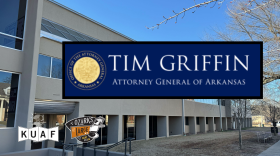Matthew Moore: Last week, the city of Fayetteville announced that Marlee Stark would be the city's first chief housing officer. Marlee joined me in the Bruce and Ann Applegate News Studio Two yesterday to talk about the job. She says this new position is exciting, as someone who has been working in city government and is a Fayetteville native.
Marlee Stark: I'm excited that the city of Fayetteville has really taken a lead, and I think really trying to create a central role about housing, you know, for our city, I think that's going to set an important precedent for the region as a whole.
If you look at kind of the national landscape in terms of cities that have chief housing officers versus don't, you know, it's mostly kind of like larger metro areas, maybe even a few mid-sized cities that have taken that leap. So I'm excited, excited to see that Fayetteville is really leading the way.
And in terms of cities of our size, I think something that I think about a lot is that when we think about, you know, housing policy, housing program moving forward, what our housing strategy is for the city as a whole, we're really going to have to think about not only our housing needs today, but really, what are our housing needs of the future going to be for Fayetteville? So I think kind of having this role be a sort of connective tissue to all of the different groups that are doing housing work is going to be a really great thing for our city.
Matthew Moore: You grew up in Fayetteville. What does it mean for you to think back on your childhood and maybe in a bit of retrospect, a little bit of the things you know now that you didn't know then, what about the past has led to this reason for needing something like this from your vantage point now?
Marlee Stark: Yeah, I mean, I think for me, you know, with my background, kind of in the policy world, you know, I really look at housing as this kind of, like, foundational component of our community. I think it unlocks opportunity. You know, just at virtually every dynamic, whether that be, you know, if you have stable housing that really helps you get to your job on time, that that provides some stability in your life, for your kids.
You know, we know there's a lot of good research around housing and the role it plays in terms of health outcomes. So I think for me, and kind of my entry into housing policy work more generally, was really just seeing housing as as critical to all of the types of work that we do as a city, making sure that our residents are, you know, well positioned, I think, in terms of economic mobility and social mobility and sort of connectivity, quality of life, those those things.
I think, as a Fayetteville resident, especially as someone who, you know, I was born and raised in Fayetteville, moved away for a number of years and returned in 2023, you know, every day I wake up and just feel really lucky that I've gotten to kind of return to the community that I feel like raised me, has really made my kind of pathway possible.
But I also know that, you know, kind of having that opportunity is a really fortunate place for me to be in to begin with. And so just want to make sure that other folks kind of have the opportunity to either stay in Fayetteville, if it's a place that they, you know, have made home and want it to continue to be their home. Want them to feel like their roots are stable. Or for folks who are interested in Fayetteville and want to make Fayetteville their home, I think housing stability is really kind of the foundation of that being a reality for folks.
Matthew Moore: What made you want to apply for this job? Why did you think you were the right person for it?
Marlee Stark: Yeah, I mean, I think the great part about, you know, I came to the city and doing economic development work, I think economic development is one of those, another phrase that means a lot of different things to a lot of different people. So over the course of two years working on that team, you know, I think we really got to explore what economic development, what economic vitality, means for the city of Fayetteville, you know.
So the way that we had defined it was really trying to kind of take a broader approach to thinking about what makes for broad based, shared economic growth for the city. I think, over and over again, we found that things like housing, childcare, transportation, all of these things that are kind of, I like to think of as, like enabling infrastructure for people, those topics keep coming up as important over and over again in conversations.
You know, we obviously hear, I think the biggest thing that we hear from our community is really just challenges of all different types of challenges that they're facing in terms of housing accessibility. So whether that's affordability, whether that looks like my family is growing and I need a different type of house, or I'm a senior and I'm on a fixed income now, I need a different living situation than I've had for the past several years. Really trying to think about housing choice, I think is something that's important.
And I think that kind of housing choice framework dovetails pretty nicely with the work that I had been doing in the economic development team.
Matthew Moore: Before we went on the air here, I asked you about kind of the difference between your previous job. You talked about economic vitality director was much more of a, I'm looking at the policy numbers. I'm looking at the spreadsheets. I'm kind of a worker bee getting stuff done. This is a very public-facing job that you're in now. How do you prepare yourself for that?
Marlee Stark: Yeah, I mean, I think when I was excited about this role, I think there's a really cool opportunity community to kind of connect the dots, not only internally. So whereas housing work kind of happening across the city, because I think, as a lot of folks will find, everyone's kind of doing a different piece of that puzzle. So making sure that we're kind of thinking about that together internally. So I'm excited to kind of be, I almost think of it as kind of like the housing cheerleader in some respects, in terms of thinking about government operations.
I think the other really cool side of things is, is it's an opportunity to connect the dots outside of, you know, a city department or division. So, you know, we've got a huge, you know, kind of ecosystem of nonprofit providers that touch housing in different capacities, touch different, you know, reach different sort of resident populations in relation to housing. So thinking about how we can work better with them, what resources they need, where the city can kind of fill those gaps, will be a really important part.
I think it's kind of a similar thing with when we think about the development community. I'm also really excited to think about how we can connect with our national or peers nationally. I think there's a really great and growing movement, pro-homes advocacy work across the country that we're seeing. I think kind of our regional conversation is definitely flowing in that direction, but also wanting to make sure that the city of Fayetteville is also connecting with other cities who are engaging in this work.
So, you know, I think we hear when we think about, think about problems or challenges that government can kind of address. You know, we often hear kind of like that whole of government model is really important, making sure that we're talking to each other. But I also think of housing, I think just more generally, as, like a whole of community approach, like, that's really what it's going to take to address our problems.
Matthew Moore: Fayetteville has been struggling with housing affordability for a while now. What is it about this specific moment that makes you believe that change can start to happen?
Marlee Stark: Yeah. I mean, I think the silver lining, if you can find one of really big, thorny challenges, or in the policy world, you know, we'll call that wicked problem sometimes, is that it really does require you to be creative, and I think it also requires you to partner with others, right?
I think something that's been really encouraging to me that I've seen over the course of this year, in particular, as we've been doing cross departmental work, as we've been doing kind of deeper community engagement strategies, is really just, I think, an eagerness for, you know, folks within the community, be that, you know, just sort of your average resident, or someone who's been involved in housing work for decades.
I think there's just something about that urgency is really, I think, making people committed to really following through and finding solutions together. And I think, you know, when you're dealing with with big challenges, especially ones that, you know, really cut at, you know, people's everyday lives in terms of housing is obviously, you know, most people the biggest, you know, line item in their in their household budget.
You know, that work, I think, can get challenging for folks over time. I think people can get weary if they don't have kind of community with each other. And so I think what I think is special about Fayetteville, and what I think I definitely pick up on is a little bit different about Northwest Arkansas when I talk to some of my peers in other communities across the country, is really just sort of this attitude of, we're going to find a solution together, regardless of, you know, what kind of work we need to do together and what we don't know yet. I think just really that willingness to work together and to kind of continue to look at data and continue to be creative about sort of what solutions we think might work, that kind of like willingness to be, you know, working together over time, being experimental, I think, is really important.
Matthew Moore: I think one of the things that sticks out to people the most about a city like Fayetteville is the massive, massive growth of the university and the student population. Every year around this time, we come on the radio and we say the University of Arkansas has record enrollment. We said it again this year too. How does that sort of situation play a role in the work that you're doing, and what sort of relationship do you have with the university? Do you hope to build to maybe even be a voice for the people of the, you know, the people who live here 12 months out of the year to talk to the university?
Marlee Stark: Yeah, I mean, I think there's, there's no, you know, path forward that doesn't involve just sort of a strong partnership with the University of Arkansas. Obviously, the presence of the student population and the university more generally is very important for our economy, certainly a driver of our growth in terms of employment as well.
I think the thing that I always like to remind folks about, sort of our student population and our student housing needs is that, you know, I think we often talk about students as sort of this, like, one dimensional group. I think students really aren't, you know, monolithic. We have a lot of different types of students, whether that be kind of like your traditional coming straight out of high school, maybe they're from Fayetteville, maybe they're from Northwest Arkansas or somewhere else in the state, going straight into college. We also have a lot of, you know, non traditional students, commuter students, like we really kind of have to think about students having a wider variety of needs than I think we tend to talk about in our conversation in the community around student housing.
So I'm really excited, I think, to use this year's annual housing assessment as an opportunity to dig a little bit deeper into student housing needs, specifically, so that we're not just sort of talking about student housing needs in terms of the development that we're seeing the market build, right? I think there's definitely an opportunity to think about, you know, how we can work with the student population themselves, so not even just university administration, which is really important, but also thinking about how we can work directly with students who are, I think we're starting to see some great advocacy come out of university student groups around the issue of affordable and accessible housing. So that's something that I'm excited to work on moving forward.
Matthew Moore: What scares you the most about this new position?
Marlee Stark: Good question. I mean, I think that the big thing that I'm hoping for with this position is really just trying to give people sort of a space to talk about how, you know, our housing challenges that we're facing as a community, how that is impacting them personally, and I understand that.
You know, at the end of the day, those changes can feel, I think, really overwhelming to folks, especially when we know a lot of people, when it comes to housing, they're just sort of like one or two months off of not making rent and that can fundamentally change your life. So I can appreciate kind of the emotion that is certainly bound up, I think, in housing work more generally.
I think what I'm trying to keep the most sort of attention on is really just thinking about how to keep that flow of conversation going, knowing that sometimes solutions take time. So really, just trying to think about how to keep people interested, involved in working together on the issue of housing in Fayetteville will certainly be important for our success.
Matthew Moore: What will success look like for you in this role?
Marlee Stark: Yeah. I mean, I think, you know, thinking about the first, you know, the next couple of months. Biggest, like, most important thing for me personally, is really just getting a clear, kind of shared understanding of where we are right now, where the gaps are, and kind of what sequence, you know, we need to move forward and in terms of prioritizing filling those gaps, right.
So another big, important, you know, thing to me that, you know, while my title is chief housing officer, you know, kind of working with this new Housing and Community Services Department, sort of reimagining what that can look like and how we can better serve our residents, building on the great work, you know, that our team has already done, is really thinking about how we can kind of connect the dots in terms of housing to other community services that are important.
So I think really thinking, you know, when I think about success, it's sort of trying to shift some of the community conversation around housing to also think about, okay, housing is sort of doesn't just exist on its own over here. It's really connected to all of these other issues that, you know, just in the long run, really contribute to overall quality of life.
Ozarks at Large transcripts are created on a rush deadline. Copy editors utilize AI tools to review work. KUAF does not publish content created by AI. Please reach out to kuafinfo@uark.edu to report an issue. The audio version is the authoritative record of KUAF programming.








